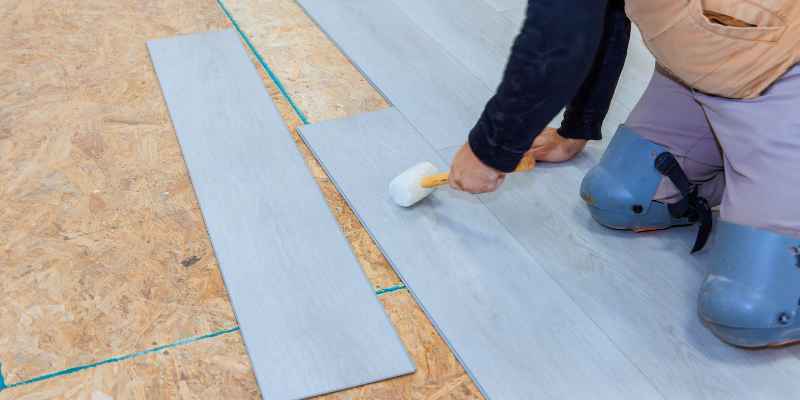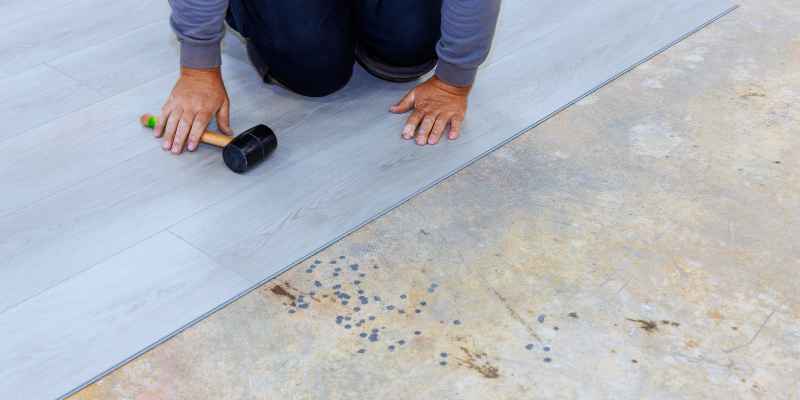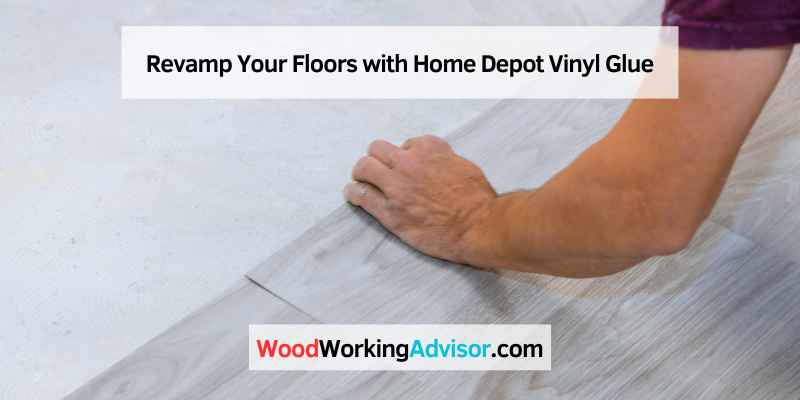Acrylic adhesives or pressure-sensitive adhesives are the best options for sticking vinyl down, while Loctite Vinyl, Fabric, and Plastic Flexible Adhesive is a good option for small repairs. When it comes to installation or repair of vinyl flooring, the choice of glue or adhesive matters a lot.
Vinyl adhesive is essential to ensure the longevity and stability of the flooring. Home Depot is a popular retailer that offers a wide range of vinyl glues and adhesives for different applications. However, choosing the right glue can be a daunting task given the vast range of options available.
We will provide you with a comprehensive list of the top vinyl glues and adhesives available at Home Depot, along with the advantages and disadvantages of each product, to help you make an informed choice based on your specific needs.
Introduction To Home Depot Vinyl Glue
Ue to use for installing vinyl flooring? Home Depot Vinyl Glue offers a reliable solution for installing vinyl flooring. With a strong hold and easy application process, this adhesive is perfect for DIY projects and professional installation alike. Available in multiple sizes, it’s a budget-friendly option for any project.
What Is Home Depot Vinyl Glue?
Home Depot Vinyl Glue is a specially designed adhesive used to fix and secure vinyl flooring for home and commercial spaces. It is a type of construction adhesive that firmly bonds vinyl tiles or planks to different types of subfloors. The adhesive works well for different types of vinyl flooring, including luxury vinyl, peel and stick, and sheet vinyl.
Why Choose Home Depot Vinyl Glue For Flooring?
Home Depot Vinyl Glue comes with multiple features that make it a top choice for flooring. It works well with different types of subfloors, including concrete, wood-based, or gypsum-based subfloors. The adhesive is also easy to use, and it dries out quickly, making it suitable for fast-track flooring installations.
With high bond strength, the adhesive ensures the vinyl tiles or planks do not separate from the subfloor, even under high traffic footfall. Moreover, the flooring adhesive is waterproof, making it ideal for areas prone to moisture, such as bathrooms and kitchens.
Cost Comparison With Other Brands
When comparing the cost of Home Depot Vinyl Glue with other flooring adhesives, it is competitively priced and offers good value for money. Compared to other popular brands such as Loctite, Henry, and LVT/LVP Glue, Home Depot Vinyl Glue is reasonably priced per gallon and offers excellent coverage, making it an affordable alternative.
Here is a quick comparison of the prices of different vinyl adhesives currently available in the market:
| Brand | Size | Price |
|---|---|---|
| Home Depot Vinyl Glue | 1 gal | $15.52 |
| Super Glue Vinyl and Leather Mender | N/A | $20.77 |
| Loctite Flexible Adhesive Vinyl Fabric & Plastic | N/A | $3.98 |
| Henry Linoleum/Vinyl Adhesive/Repair | 1 gal | $33.00 |
| LVT/LVP Glue Luxury Vinyl Floor Adhesive | 4 gal | $42.99 |
In conclusion, Home Depot Vinyl Glue proves to be a reliable and affordable option in the fiercely competitive flooring adhesive category. With its unique features and bond strength, homeowners and contractors alike can count on it to securely fasten vinyl floors and provide long-lasting results.

Preparing To Install Self-stick Vinyl Floor Tile
Prepare to install self-stick vinyl floor tiles with Home Depot’s vinyl glue for a secure bond that lasts. Plan the installation, select tiles, and roll the floor to ensure a smooth finish. Acrylic adhesives are recommended for bonding vinyl to the subfloor while pressure-sensitive adhesives are best for installing flooring that requires pressure.
Measuring And Planning The Installation Area
Before you start installing self-stick vinyl floor tiles, take the time to measure and plan the installation area. This will ensure that you have the right amount of tiles and that they are installed properly.
Preparing The Subfloor
An important step in preparing to install self-stick vinyl floor tiles is to make sure the subfloor is clean and free from any debris. Use a broom or vacuum to remove all dirt and dust. If the subfloor is uneven, use a self-leveling compound to even it out and create a smooth surface for the tiles to adhere to.
Choosing The Best Type Of Vinyl Glue For Self-stick Flooring
There are various types of vinyl glue available for a self-stick vinyl floor tile installation. It is important to choose the right type of glue, depending on the subfloor and the type of vinyl tiles you are using. Here are some options available at Home Depot and other stores:
- Construction adhesive
- LVT/LVP glue
- Loctite flexible adhesive
- Henry linoleum/vinyl adhesive/repair
- Super glue vinyl and leather mender
Tools And Materials Required For Installation
To ensure a successful installation of self-stick vinyl floor tiles, it is important to have the right tools and materials on hand. Here are some of the tools and materials required for installation:
| Peel-and-stick vinyl floor tiles | |
| Measuring tape | |
| Straight edge (for cutting tiles) | |
| Utility knife | |
| Self-leveling compound | |
| Construction adhesive | |
| Rubber float (for smoothing the tiles) | |
| Broom or vacuum | |
| Roller (for pressing the tiles into place) | |
| Wall base and mouldings |
By following these steps and using the right tools and materials, you can have a successful installation of self-stick vinyl floor tiles in your home.
Installation Process For Self-stick Vinyl Floor Tile
To install self-stick vinyl floor tile using Home Depot Vinyl Glue, first prepare the subfloor and plan the installation. Then, select tiles and fix end tiles before rolling the floor. Install wall base and mouldings using tools and materials like Super Glue Vinyl and Leather Mender or LVT/LVP Glue Luxury Vinyl Floor Adhesive for the best results.
Peel And Stick Backing
Before we begin laying self-stick vinyl floor tile, it’s essential to peel and stick the backing paper from the tiles. This step is easy as it involves removing the protective paper from the adhesive side of each tile. Once you have removed the paper, your tiles are ready to be installed.
Selecting Vinyl Tile And Fixing End Tiles
The next step in the process is to select the vinyl tile and the best design for your room. Before you begin, ensure that the subfloor is free of dirt, debris, and any other foreign material. We recommend fixing the end tiles at the center of the room to ensure that they align correctly. This task ensures there are no odd-sized tiles at the room’s edges, providing an aesthetically pleasing finish.
Rolling Out The Vinyl Tile On The Subfloor
When laying self-stick vinyl floor tile, it’s crucial to consider the direction of the tiles. The tiles should be installed perpendicular to the room’s longest wall to ensure a cohesive and professional look. When rolling out the vinyl tile on the subfloor, ensure that you maintain the pattern and alignment. Use a roller to press out all the air bubbles, ensuring the tiles adhere tightly to the subfloor.
Installing Wall Base And Mouldings
After installing the tiles, it’s time to install the wall base and mouldings. This task involves using a miter saw to cut the moulding to the correct length. Ensure that each piece of the moulding adheres to the wall and floor using an adhesive. When fitting the moulding, ensure that you cut it at a 45-degree angle on corner pieces, providing a clean and finished look, and don’t forget to fill nail holes with wood putty once the moulding is in place.
In conclusion, installing self-stick vinyl floor tile is a simple yet stunning way to transform a room. With this guide’s help, anyone can lay vinyl tiles professionally, providing a lasting and beautiful finish to their room.
Different Types Of Vinyl Glue
Home Depot offers a range of vinyl glue options including liquid, paste, and construction adhesive. These products can be used for multiple applications such as flooring, shoe repair, and construction. Prices vary depending on the type and size of the product.
Acrylic Adhesives
When it comes to acrylic adhesives for vinyl, Home Depot offers a wide range of options. One such product is the Henry Linoleum/Vinyl Adhesive/Repair glue, which can be used for repairs as well as installations. The glue is waterproof and dries clear, making it ideal for use in areas with exposure to moisture. Another option is the Loctite Flexible Adhesive Vinyl Fabric & Plastic glue, which has a strong bond and is also resistant to water. It is perfect for use on vinyl fabric or plastic surfaces.
Pressure-sensitive Adhesives
Pressure-sensitive adhesives are another type of vinyl glue sold at Home Depot. One example is the Super Glue Vinyl and Leather Mender, which is specially designed for repairs on vinyl and leather surfaces. Its super-strong bond can withstand heavy use and is ideal for repairing tears or holes in vinyl surfaces. Another option is the LVT/LVP Glue Luxury Vinyl Floor Adhesive, which is perfect for installing luxury vinyl flooring. This pressure-sensitive adhesive forms a strong bond between the vinyl flooring and the subfloor.
Vinyl, Fabric, And Plastic Flexible Adhesive
Home Depot offers a range of flexible adhesives for vinyl, fabric, and plastic surfaces. One product that stands out is the Outdoor Essentials White Vinyl Fence Cement. This flexible adhesive is designed specifically for outdoor use and can bond vinyl fences to posts and rails. Another option is the Gorilla Glue for Vinyl, which can bond a range of materials, including vinyl, ceramic, metal, wood, and more. It forms a strong, permanent bond and is waterproof, making it perfect for outdoor use.
In conclusion, if you’re looking to buy vinyl glue, Home Depot is a great place to start. With a wide variety of products available, including acrylic adhesives, pressure-sensitive adhesives, and flexible adhesives, you’re sure to find the right vinyl glue for your needs. Moreover, with the prices ranging from as low as $3.44 to $208.68, you can find a glue that suits your budget.
Pros And Cons Of Home Depot Vinyl Glue
If you’re planning to install vinyl flooring, you might want to consider using Home Depot vinyl glue. Using a high-quality adhesive can improve the durability and longevity of your vinyl floor tiles and planks. While Home Depot vinyl glue has its advantages, it also has some notable drawbacks to consider.
Advantages Of Home Depot Vinyl Glue For Flooring
- Strong and Durable Adhesion: Home Depot vinyl glue is known for its strong and durable adhesion, which helps keep your vinyl floor tiles and planks securely in place for years.
- Resistant to Moisture and Heat: The adhesive is designed to resist moisture and heat, making it ideal for humid environments or areas with extreme temperature changes.
- Easy to Use: Home Depot vinyl glue is easy to use, especially for DIY enthusiasts. Simply apply the adhesive to the subfloor and lay the vinyl tiles or planks over it.
Disadvantages Of Using Home Depot Vinyl Glue
- Strong Odor: Home Depot vinyl glue has a strong odor that can be unpleasant to some individuals. It’s important to use the adhesive in a well-ventilated area to avoid inhaling the fumes.
- Time-Consuming: Installing vinyl flooring with Home Depot vinyl glue can be time-consuming, as you have to wait for the adhesive to dry properly before laying the tiles or planks.
- Difficult to Remove: Once Home Depot vinyl glue has set, it can be challenging to remove, making it tough to replace damaged vinyl tiles or planks.
Customer Reviews And Ratings
Overall, customers have had positive experiences using Home Depot vinyl glue for their vinyl flooring installations. Many have praised the adhesive for its strength and ease of use. However, some have complained about the strong odor and the time it takes for the adhesive to dry fully.
When choosing a vinyl flooring adhesive, it’s important to weigh the pros and cons carefully to make an informed decision. Home Depot vinyl glue might be the right adhesive for you, but it’s always a good idea to consider other options and compare products before making a final decision.

Tips For Maintaining Self-stick Vinyl Flooring
Self-stick vinyl flooring is a popular choice for many homeowners because it is easy to install, low-maintenance, long-lasting and affordable. However, like any other flooring material, it requires regular care and maintenance to ensure it stays in great shape. Here are some tips for maintaining your self-stick vinyl flooring:
Regular Cleaning And Sweeping
One of the easiest ways to keep your self-stick vinyl flooring looking brand new is by cleaning and sweeping it on a regular basis. Vacuum or sweep up any dirt, dust or debris that accumulates on the surface daily. Use a damp mop and a mild cleaning solution to clean the floor weekly or as needed. Avoid using too much water, as excess moisture can damage the adhesive or cause the tiles to loosen.
Avoiding Abrasive Cleaners
Do not use abrasive cleaners, bleach or ammonia-based cleaners on self-stick vinyl flooring, as they can cause the material to discolor or deteriorate. Avoid using scrub brushes, steel wool or abrasive sponges, as they can scratch or dull the surface of the tiles. Instead, use gentle cleaning agents that are specifically designed for vinyl flooring, and follow the manufacturer’s instructions for best results.
Repairing Tears Or Loose Seams With Vinyl Glue
Accidents can happen, and tears, scratches or loose seams can occur on self-stick vinyl flooring. These issues can be repaired easily with vinyl glue. Simply apply the glue to the affected area, ensuring that it is evenly distributed. Use a putty knife or roller to smooth out any bumps or bubbles, and let the glue dry completely before walking on the floor. With regular care and maintenance, your self-stick vinyl flooring will remain beautiful and functional for years to come.
Conclusion
To sum up, Home Depot Vinyl Glue is the ideal adhesive for any vinyl flooring or sheet installation project. It is available in various sizes and types, depending on the surface area you need to cover. With its affordable price and excellent quality, this product promises to give you impressive and long-lasting results.
Whether you are doing a DIY project or a professional installation, Home Depot Vinyl Glue can accommodate your needs and expectations. So, grab a bottle of this fantastic adhesive and get started on your vinyl flooring project today!


